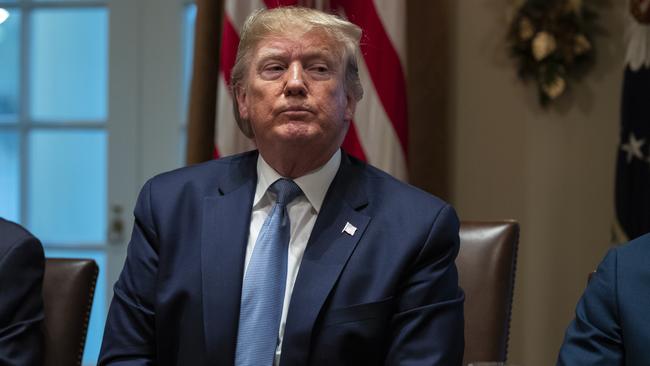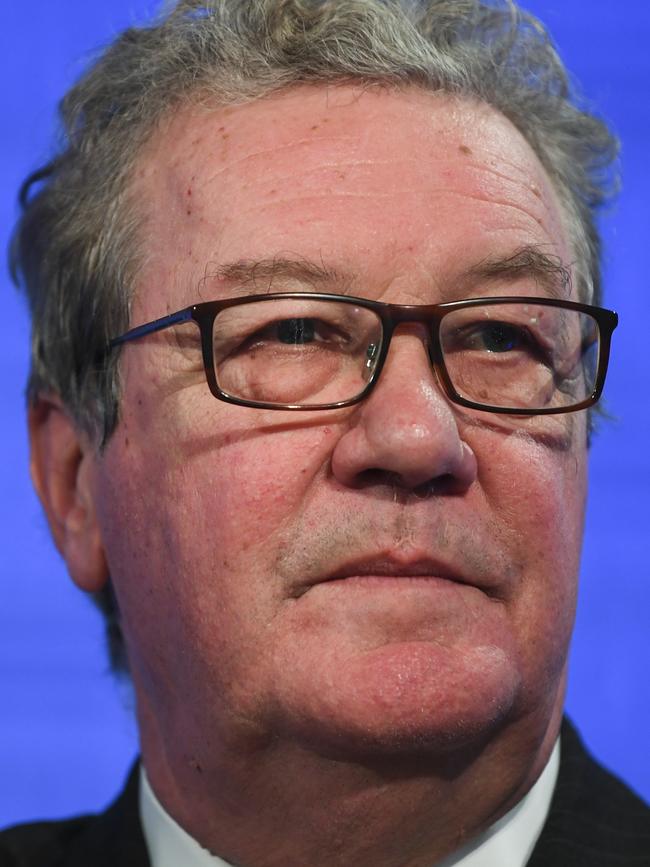
It was a tip-off provided by Australia’s high commissioner to London, Alexander Downer, about the meeting he had in a London wine bar two months earlier with then Trump aide George Papadopoulos.
Papadopoulos had told Downer that Russia had damaging emails on Donald Trump’s political opponent Hillary Clinton.
According to a major report released by Justice Department inspector-general Michael Horowitz, those FBI officials included then director James Comey, deputy director Andrew McCabe and two FBI officers who were having an affair, Peter Strzok and Lisa Page.
They were weighing up a grave decision. The FBI already knew Russia was targeting US political institutions but the suggestion it might try to help a US presidential candidate was another thing.
Yet any decision to effectively investigate a political campaign was fraught with ethical issues.
McCabe argued that Downer’s information was serious enough to justify a fully fledged probe into possible links between Russia and the Trump campaign.
He told his colleagues it was a “tipping point”. Another FBI official, Bill Priestap, argued that because Australia provided the information and it was such a trusted ally, it was wise to open an investigation. Senior FBI officials agreed unanimously and on July 31 the FBI launched Operation Crossfire.
That decision would dominate US politics for the next three years and confront Australia with a dangerous and sensitive diplomatic issue with its key ally. The 435-page report released by Horowitz finds that the FBI was justified in making that decision to initiate the Russia probe purely on the basis of Downer’s claims.
But US Attorney-General William Barr disagrees and says the decisions taken by the FBI that day on the basis of Downer’s information were wrong.
Barr says it is “clear that the FBI launched an intrusive investigation of a US presidential campaign on the thinnest of suspicions that, in my view, were insufficient to justify the steps taken”.
The FBI’s decision suddenly placed Downer in the middle of one of the most explosive issues of the Trump presidency.

The day after the investigation was launched Strzok and a colleague flew to London to interview Downer and another Australian official who was at the meeting, Erika Thomson.
Downer had met with Papadopolous in May but he didn’t think much of him and only included his claims in a routine report to Canberra’s Department of Foreign Affairs.
But two months later WikiLeaks dumped a flood of Russia-hacked emails to damage the Democrats and Clinton.
Downer suddenly realised how important the Papadopoulos information was, so he decided to tell the US directly. He called the US embassy in London, saying he wanted a face-to-face meeting about an “urgent matter”.
Downer told the US deputy head of mission in London that Papadopoulos “suggested the Trump team had received some kind of suggestion from Russia that it could assist this process with the anonymous release of information during the campaign that would be damaging to Clinton (and President Obama)”.
“It was unclear whether he (Papadopoulos) or the Russians were referring to material acquired publicly of (sic) through other means. It was also unclear how Mr Trump’s team reacted to the offer. We note the Trump team’s reaction could, in the end, have little bearing of what Russia decides to do, with or without Mr Trump’s co-operation,” Downer wrote.
When Strzok arrived in London, Downer gave all the details he had. “During the interview they learned that Papadopoulos did not say he had direct contact with the Russians,” the report states. “They (also) learned that Papadopoulos did not specify any other individual who received the Russian suggestion.”
Downer’s information was vague at best. So the FBI investigators focused on three members of the Trump campaign who had ties or a travel history to Russia — Carter Page, Paul Manafort and Michael Flynn. At that point the FBI’s investigation started in earnest while Downer and the then Turnbull government lay low, determined not to get caught in the crossfire of the operation.
It didn’t take long for the Russia investigation to be bogged down in controversy.
Trump was furious about what he saw as a politically motivated attempt by the FBI to help Clinton at his expense. The President fell out with FBI chief Comey and eventually sacked him, leading to the appointment of special counsel Robert Mueller.
The agents and lovers Strzok and Page were caught swapping text messages staunchly opposing the election of Trump. After he left office, Comey and McCabe, who was also removed, emerged as fierce critics of Trump.
With each revelation Trump became more convinced that the FBI’s investigation was run by Democrat activists and was politically motivated.
In May Barr ordered a sweeping investigation into the origins of the Russia probe to see if the FBI had been motivated by a dislike of Trump rather than by the evidence. He ordered two probes, one by Horowitz and another by prosecutor John Durham, who will report next year.
Barr said outright at the time that he was suspicious of the FBI’s justification for the investigation. When Trump came out in late May and said he wanted Barr to look into the role played by other countries, including Australia, alarm bells rang in Canberra.
Trump was also threatening to declassify any US documents linked to the start of the Russia probe. This risked exposing Downer’s report to the public in a US document which could have contained all sorts of other sensitive information.
So Australia’s ambassador to the US, Joe Hockey, wrote Barr a letter saying Canberra was happy to co-operate fully with the inquiry. It was a way of trying to ensure nothing else beyond the Downer report was released. This tactic paid off, with Barr going out of his way on Tuesday (AEDT) to praise Australia’s tip-off while at the same time criticising the FBI for using it as the “thinnest” excuse to start an inquiry. But release of the Horowitz report will not resolve arguments over the FBI’s behaviour in launching the Russia investigation.
Horowitz says the FBI’s decision to start the probe was justified and he argues the investigation itself was not politically biased.
However, he details a worrying litany of mistakes in procedures by the FBI in its efforts to obtain a warrant to surveil Page.
“In the rush to obtain and maintain FISA surveillance of Trump campaign associates, FBI officials misled the FISA court, omitted critical exculpatory facts from their filings, and suppressed or ignored information negating the reliability of their principal source,” Barr said.
The arguments over the FBI’s conduct will continue. But for Australia and Downer it has been an uncomfortable journey living dangerously in the middle of such an explosive issue. With the Horowitz report, and with Barr’s praise, the worst now appears to be over.




Inside FBI headquarters in Washington in late July 2016, senior officials debated for three days what they should do with the unexpected piece of information sitting in front of them.